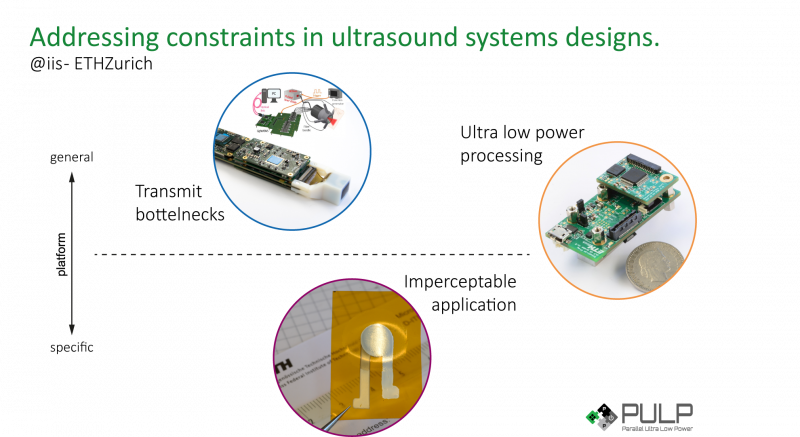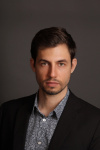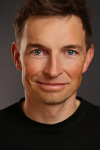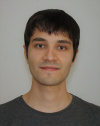Difference between revisions of "Digital Medical Ultrasound Imaging"
From iis-projects
(→Physical Characterization and Electro-Mechanical Testbeds) |
(→Physyological Experiments and Electro-Mechanical Testbeds) |
||
| Line 110: | Line 110: | ||
category = UShw | category = UShw | ||
</DynamicPageList> | </DynamicPageList> | ||
| − | ====Physyological | + | ====Physyological Characterization and Electro-Mechanical Testbeds==== |
<DynamicPageList> | <DynamicPageList> | ||
supresserrors = true | supresserrors = true | ||
Revision as of 11:09, 11 October 2023
(scroll down for open projects)
Contents
Our Activities
At IIS, we are exploring the next generation of medical ultrasound system. Our Flagship projects are:
- LightABVS: a high-end ultrasound probe, evolution of LightProbe, which incorporates 192 channels and communicates with a host PC via two 100G Ethernet optical links
- USdot: a reduced number of channels (32), compact, wireless probe for wearable applications
- WULPUS: an ultra-low power (20mW) probe for long-term monitoring
We focus our ultrasound system developments on the challenges posed by high-speed acquisition and the resulting front-end data rates. Our main goals include the efficient processing and transmission of this data off-head. In addition, we are actively working on developing strategies to manage the power and thermal constraints of these devices. Furthermore, we strive to offer wearable solutions as well as alternatives to the traditional bulky and rigid system designs.
This is an ongoing project at our lab and we are looking for motivated students to contribute on the following topics:
- Firmware Development
- System level design for hardware-software interactions, multi FPGA system, high bandwidth links (VIVADO/IP/HW-SW Codesign)
- Programming of software functions: Microcontroller Programming / Processing system programming (C/C++/CUDA)
- Power/Thermal optimization: Modelling, Control, Task Scheduling (Matlab)
- Hardware Development
- Implementation of processing subunits: Hardware design FPGA/ASIC (VHDL/HLS)
- PCB Design (Altium, Ansys SIwave)
- Physical Characterization and Electro-Mechanical Testbeds
- Design of physiological experiments and data analyses (Python)
- Characterization and Testing (ADS Keysight/Spice/PCB Design/C/Python/Matlab)
- Ultrasound Signal Processing and ML
- Machine Learning (Python, MCU, FPGA)
- Ultrasond imaging algorithm development/improvements/tailoring for implementation (Matlab)
- Fusion of ultrasound with other biosignals: system, circuit, and algorithm design (Spice, Altium, Python)
Who are we
Dr. Andrea Cossettini
|
Dr. Christoph Leitner
|
Sergei Vostrikov
|
Federico Villani
|
Sebastian Frey
|
Highlights of Past Projects
Open Projects
This is a fast-evolving project area. If you are interested in the topic and want to do something in the areas mentioned above, come to see us to discuss up-to-date project opportunities! Showing up with your own project ideas is also very appreciated.
Firmware Development
- Development Of An FPGA-Based Optoacoustic Image Reconstruction Platform for Clinical Applications
- Design of combined Ultrasound and PPG systems
- Improving datarate and efficiency of ultra low power wearable ultrasound
- Battery indifferent wearable Ultrasound
- Wearable Ultrasound for Artery monitoring
- Automatic unplugging detection for Ultrasound probes
Hardware Development
- Ultrasound measurement of microbubble stiffness for in situ detection of protease activity in clinical settings
- Integrating Ultrasound Technology into a Fitness Tracking Device (1M, 2 B/S)
- Design of combined Ultrasound and PPG systems
- Battery indifferent wearable Ultrasound
Physyological Characterization and Electro-Mechanical Testbeds
- Skin Coupling Media Characterization For Fitness Tracker Applications (1 B/S)
- Adaptively Controlled Polarization And Hysteresis Curve Tracing For Polymer Piezoelectrics (1 S/B)
- Development Of A Test Bed For Ultrasonic Transducer Characterization (1 S/B)
- Design of combined Ultrasound and PPG systems
- Wearable Ultrasound for Artery monitoring
Ultrasound Signal Processing and ML
- Development Of An FPGA-Based Optoacoustic Image Reconstruction Platform for Clinical Applications
- Ultrasound measurement of microbubble stiffness for in situ detection of protease activity in clinical settings
- Ultrasound image data recycler
- Wearable Ultrasound for Artery monitoring
- Machine Learning for extracting Muscle features from Ultrasound raw data
- Machine Learning on Ultrasound Images
- Visualizing Functional Microbubbles using Ultrasound Imaging
All projects are annotated with one or more possible project types (M/S/B/G) and a number of students (1 to 3).
- M: Master's thesis: 26 weeks full-time (6 months) for one student only
- S: Semester project: 14 weeks half-time (1 semester lecture period) or 7 weeks full-time for 1-3 students
- B: Bachelor's thesis: 14 weeks half-time (1 semester lecture period) for one student only
- G: Group project: 14 weeks part-time (1 semester lecture period) for 2-3 students
Usually, these are merely suggestions from our side; proposals can often be reformulated to fit students' needs.
Projects in Progress
Completed Projects
- Ultrasound based hand gesture recognition
- Design of combined Ultrasound and Electromyography systems
- Ultra low power wearable ultrasound probe
- Machine Learning for extracting Muscle features using Ultrasound 2
- Ultrasound Low power WiFi with IMX7
- Ultrasound signal processing acceleration with CUDA
- Minimum Variance Beamforming for Wearable Ultrasound Probes
- Machine Learning for extracting Muscle features using Ultrasound
- Compression of Ultrasound data on FPGA
- LightProbe - 200G Remote DMA for GPU FPGA Data Transfers
- Time Gain Compensation for Ultrasound Imaging
- LightProbe - WIFI extension (PCB)
- LightProbe - Implementation of compressed-sensing algorithms










